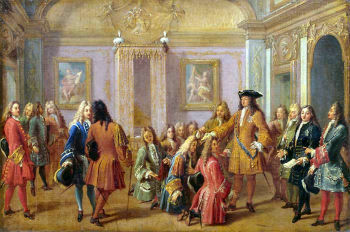O lobby, at politics, is, by definition, any and all practices exercised by people or companies to influence decision-making spaces of public power, acting both in the Executive and in the Legislative, being more frequent in the latter sector mentioned. The set of people and institutions that seek to influence public decisions is called pressure group.
Basically, lobbying is a way to communicate, debate or try to convince parliamentarians or government executives (in addition to close employees, such as advisors and secretaries) to make a particular decision to serve particular interests or general.
Lobbying should not always be considered an erroneous, immoral or negative practice. For example, if a civil group makes a petition for the non-approval or sanction of a law, then there is a case of lobbying being practiced. However, this practice is more common in the so-called "backstage politics", in which groups or organized caucuses act in the corridors of parliament to influence politicians to approve or disapprove certain actions public services.
In Brazil, the concept of lobbying has gained a negative connotation, being commonly related to corruption, but its original conception does not foresee this practice as something illicit, given that any citizen can talk or promote a debate with elected politicians to attend to their interests.
The big issue around this discussion lies in the fact that, in some cases, lobbyists (so called the “agent” responsible for facilitating or operationalize lobbying practices) provide bribes or bribes, acting unlawfully or without public knowledge in order to serve interests specific.
There are, therefore, those who are against the practice of lobbying, considering that this means is undemocratic in the sense of prioritizing specific interests, rather than the wishes of the society in general. On the other hand, there are opinions that are even favorable to lobbying, but defending its regulation, or that is, the establishment of legislation that says what is right, what is wrong and how everything should be done.
Do not stop now... There's more after the advertising ;)
The main issue around lobbying practices is the lack of transparency, which, in theory, would be tackled with a regulation of this type of conduct. For example: if the Minister of Agriculture receives agribusiness lobbyists at a meeting, there must be a publication in official medium, with the agenda and issues specifically described so that the population knows what is at stake in this question. This is also important for other groups that eventually oppose the decisions or interests of this meeting can also lobby and ensure the divergence of ideas, something necessary for the field democratic.
In the United States, for example, the practice of lobbying is regulated. There is even a record of the position of lobbyist, which would be that professional specialized and hired by companies, unions or even individuals to mediate the lobby. The merit of this function would be the fact that the lobbyist knows better the articulations and functioning of the political and public environment, in order to better address the demands of pressure groups.
In addition to this discussion, there are, from an ethical point of view, some limitations to lobbying. The first is when this practice concerns private interests to the detriment of the preservation of public, social or environmental, such as carrying out a game of influences to allow a certain area to be deforested for the demarcation of lands.
Another common case where lobbying is considered wrong or immoral is when it takes place within the judiciary. In 2012, the OAB (Lawyers Organization of Brazil) launched a campaign to end this occurrence, given that it is very It is common for lawyers, jurists or people not directly connected with the environment to try to influence judges and judges.
By Rodolfo Alves Pena
Graduated in Geography



